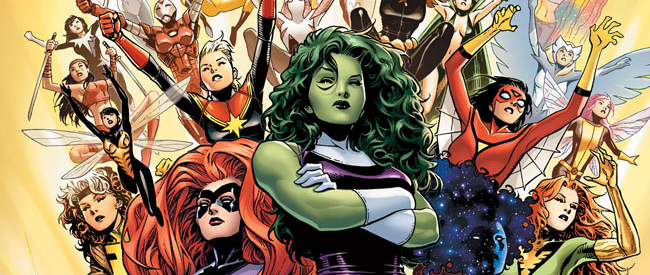
When reading Marguerite Bennett’s work, you’re immediately struck by the depth of characterization and the masterful pacing of her stories, and that’s quickly made her a force to be reckoned with.
Marguerite Bennett is contributing to the Broken Frontier Anthology, created to celebrate the magic of creator-owned comics. Check our Kickstarter campaign and please share it with your friends on social media using #BFanthology. You can find Marguerite on Twitter @EvilMarguerite.
Marguerite Bennett’s star sure is on the rise, as she’s landing writing gigs at both major mainstream publishers while maintaining a furious schedule of creator-owned projects and collaborations. Most recently, Marvel Comics announced she’d be teaming up on A-Force a heroine-centric book with G. Willow Wilson.
Set during the publisher’s massive new crossover that revisits the Secret Wars concept, A-Force may just be the most accessible, accurate representation of the all-female superhero team to hit the shelves in years – if not ever.
With such a diverse output and an ever-increasing profile in the fickle world of funny books, it’s no wonder we tapped Bennett as one of the contributors to Broken Frontier’s first original anthology.
You’re no stranger to collaboration, teaming up with the likes of G. Willow Wilson, Kieron Gillen, and Arash Amel. What are the benefits of working with another writer? What is your collaborative approach or role in these situations?
I’ve been unspeakably lucky to work with the talented writers I have. Having someone else working alongside you allows you to create an even deeper image of your world – allows you to explore elements you had not considered, perspectives you had not explored. I made Batman the unwitting villain of my first published comic, because Scott Snyder’s run had clarified how deeply intertwined Batman’s sense of justice was with his sense of obsession.
If you’re thinking to collaborate on your own projects, I might suggest knowing up front what is expected of each of you. Talk about your strengths, your insecurities, your vision for the project, what aspect you are most excited about, least excited about, what your own flaws are, and what you’re hoping to do with your collaborator.
Be specific. Don’t say “Well, I like writing dialogue”; think. Are you good at writing funny dialogue? Are you good at quick exposition? Do you prefer prose and captions? Fight scene one-liners? Terrifying threats? Banter, flirtation, sound effects, comic book science, sweeping speeches, eerie non-sequiturs?
What are you not good at? I’m dreadful at fight scenes – I defer almost entirely to my collaborators beyond, “Hmm, I was thinking this move might be cool, and this beat might showcase her speed, or we could show off the grandeur of their environment if we did this, but I’m not sure how that would look on the page.” Work with each other. Everyone wants this project to succeed. Communicate and be supportive.
Your work on books such as Swords of Sorrows and A-Force shine a spotlight on both female comics characters and female creators. How have gender roles changed in the medium, both on and off the page? How much more growth need to happen in this area?
You’re not going to be happy with me – I can’t give a definitive answer. I only know what I’ve experienced. “How have gender roles changed in the medium, both on and off the page? How much more growth need to happen in this area?” could be the subject of a book, a class, a social movement, and – ideally – my entire life’s work. I’m not going to be able to answer it in a paragraph.
I will say this: the awareness of the female market has not necessarily come with the recognition that women are people.
Too often I see “Oh, stick some romance in it for the ladies, stick in a woman who’s an awesome fighter in it for the girl readers, it’s true that neither of them has any personality or clear arc other than to help the lead realize his goals, but look!! We have women in it!!” You can’t phone in cultural change.
It’s exceptionally difficult to quantify that growth; life influences art which influences life which influences art and on and on. We see stories that treat women as prizes, as window dressing, as kick-ass second-best sidekicks and romantic interests, and women grow up believing that is what they’re good for. We’ve engineered a society that insists that romance and traditional femininity are all women are good for, and then promptly shames them for it. We have EONS to go.
Do gender roles figure prominently in your writing or do you tend to focus more on the story at hand?
It’s as impossible for me to write without an awareness of gender roles, as it would be impossible for me to write without an awareness of my senses. Gender roles influence everything that I say or do, no matter how insignificant. Every interaction is charged with gendered expectation. The same clerks are far kinder when I wear makeup; retail workers are more patient when I am well dressed.
I am expected to be patient and deferential. I am expected to act surprised, humbled, and flattered when being told I did good work. Men grow angry when I do not smile on command; they call me slurs when I don’t respond to their flirtations on the street and well-meaning friends ask if I wasn’t maybe wearing too low a top and should have prepared for that reaction, hmmm?
Even my answer is going to be accused of sounding bitchy or being hypersensitive. The topic can’t even be discussed without already being steeped in expectation. Everyone else has made my gender the single most importance thing about me, and there’s only so long before you break under that yoke.
I think only once have I ever written a story where gender roles were the focus, but it permeates my entire life and the entire life of every person on this planet, whether or not they choose to acknowledge it.
You seem to move pretty easily between mainstream comics, with your work for DC and Marvel, and your projects for smaller publishers such as BOOM!/Archaia. Do you have a preference? Is there a difference in the way you write for each market?
I think that diversity allows me not to go crazy. I would burn out if I worked on multiple projects identical in tone or theme. My Marvel work is a bit too dark and my DC work is a bit too cheerful. My BOOM! work is bizarre and fanciful and my Archaia work is hard realism.
Solid character development is a hallmark of your comics stories. Generally speaking, what comes first for you, the character or the plot? What major themes do you seem to return to in your writing?
That is very kind of you to say, thank you! For me, character must come first. I honestly even just walk around the house imagining being that character, how they might approach responsibility, what they would eat and why, how they would handle stressors of the day in light of their own backstories and concerns and priorities – sometimes even lying in bed at night, worrying about what I imagine they would worry about.
After I feel like I know what makes them tick – what makes them proud, anxious, uncomfortable, tender, grateful, unhappy – I can start constructing a story that will provoke them.
As far as themes, I vacillate. Body horror isn’t a theme, but it is a state of being that appears in my work over and over. Obsession with another person, whether or not they think of you the same. The mistreatment and marginalization of other human beings.
What can you tell us about your story for the anthology? What attracts you to the anthology format?
Anthologies allow me to be free and weird and to tell stories no major label would touch. My first anthology experience was with Rachel Deering’s In the Dark through IDW – a story about a pair of murderous Victorian lesbian monsters taking revenge.
It also allows me to pull in brilliant new artists. I can’t wait for you to see Varga Tomi, who’s been a friend of mine for a few years and who I can finally collaborate with publicly. His colors are just divine. I can’t wait for y’all to see.





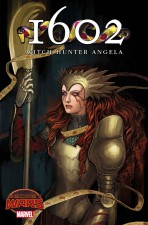
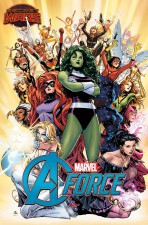
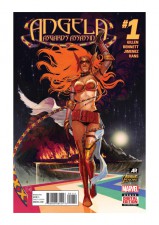
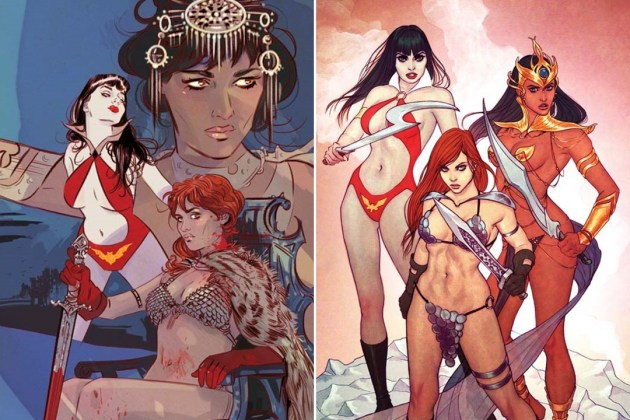
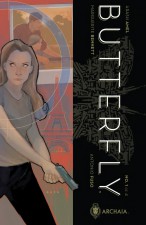
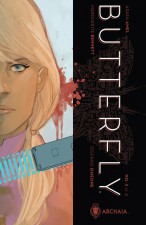
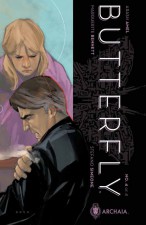
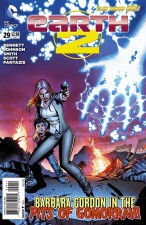
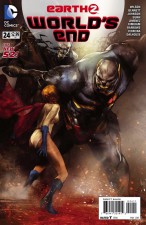

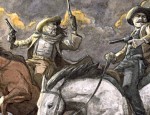

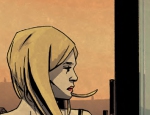
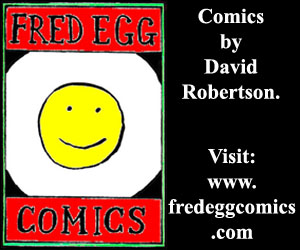

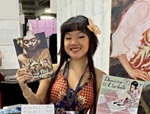
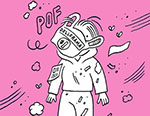
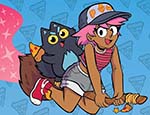
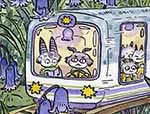
(The following is in reply to Marguerite Bennett rather than Jason Wilkins, whose article appears above.)
Miss Bennett, yours is not an uncommon perspective, but I have to take exception with a couple of your assessments and conclusions. Just a couple, though, and since you didn’t provide an in-depth context for some of the events you cite, I’ll have to generalize based on the information you did provide. And, to be fair, you do say, “I only know what I’ve experienced.” Basically, it seems you sometimes see “gender offenses” in places where they do not necessarily exist.
You wrote that “…every interaction is charged with gendered expectation. The same clerks are far kinder when I wear makeup; retail workers are more patient when I am well dressed.” Maybe. Only maybe. As a man, I find that clerks tend to be more attentive or respectful when I’m not sporting a 5 o’clock shadow and dressed shabbily. You may be experiencing the same effect and misinterpreting the behavior. Clerks are human beings, too, and there is often a tendency to stereotype customers who are well-dressed and clean-shaven (or with make-up properly applied) as more likely to make a purchase. Level of affluence usually affects one’s mode of dress.
You also said, “I am expected to be patient and deferential. I am expected to act surprised, humbled, and flattered when being told I did good work.” In professional environments, which is where I assume you’ve set these events, patience and deferential behavior ARE expectations — especially for junior employees interacting with more senior employees or management. This is true, whether the junior employee is a male OR female. In addition, while each of us tends to believe that ALL of our work is “good work,” our own assessment may differ from reality (or from the expectations, fair or not, of management). And since it is management that is charged with responsibility for the end product, and the employer who is paying our wages, then they have the final say as to whether or not our work is “good work.” When it is good work and we know in our hearts that is, it’s still good policy to “act surprised, humbled, and flattered” when we are told so. It may seem two-faced in doing this, but in part it is a polite acknowledgment on our part to their recognition of our good work. Again, these aren’t necessarily by-products of “gendered expectations” but more likely just expectations of workplace comity and respect. Management and senior personnel are generally in their positions by dint of their greater experience and knowledge. Not always, but more often than not. Junior personnel, with the comparative lack of experience, often have a higher self-assessment than in warranted and their attitudes can often reflect that. Again, I do not know your personal experiences and am only replying based on the context you’ve provided. But, you might want to keep the aforementioned in the back of your mind while making your assessments about gender’s role on expectations and interactions with others. It might save you from some unnecessary, self-inflicted grief.
In response to a question about female characters in the medium, you said: “We see stories that treat women as prizes, as window dressing, as kick-ass second-best sidekicks and romantic interests….We’ve engineered a society that insists that romance and traditional femininity are all women are good for, and then promptly shames them for it. We have EONS to go.” I’ll offer DC’s Wonder Woman from the WW2 era and onward; Marvel’s Red Sonja from the 1970s/1980s era; and Marvel’s Electra from the 1980s as three examples to rebut to your statements here. Neither were window dressing, second-best, romantic interests, nor objects for shame. They were strong central characters while their respective comics were in print, and very popular with both boys and girls (or, if you prefer, “men and women” or “guys and gals”, take your pick).
The truth is, we do not have “EONS to go.” We’re a LOT closer (in the U.S., at least) to whatever vision of “gender parity” that social plaintiffs often claim we lack. When you perceive female characters as window dressing, second-best sidekicks, or romantic interests, please also remember that human beings (men and women alike) are by nature social creatures who interact with each other, while still maintaining an individual focus. In story telling, a writer needs to account for these points, and the focus of the story must naturally place the emphasis on the central character. Other characters in the narrative, male and female alike, must therefore take a secondary role. This isn’t a reflection of “gender bias” but merely a reflection of the limited nature of the medium (in this case, the comic book).
You said that your answer “is going to be accused of sounding bitchy or being hypersensitive. The topic can’t even be discussed without already being steeped in expectation. Everyone else has made my gender the single most importance thing about me.” Bitchy? I don’t know you, nor your usual disposition, so I can’t make that assessment. But hypersensitive? Yes, perhaps a bit so. But that sensitivity could, at least in part, justifiably be the result of your some (or many) of your past experiences. If you’ve had a lot of interactions with boorish clods or just plain inconsiderate or insensitive people, then it’s understandable your perspectives would be correspondingly colored by those experiences. It’s understandable, but not entirely excusable. Unless you want to wind up being the very thing (just in a different wrapper, so to speak) that has caused you revulsion, please remember that there are just as many — and probably many more — decent people in this country who do not prejudge you by your gender. And they’re not exclusive to your generation, either. (One example of someone whom, I suspect, does NOT make your gender “the single most important thing” about you is your friend, Varga Tamás. From the occasion I had to talk with him and his friends at a recent convention, he struck me as a very well-grounded individual with a good head on his shoulders. He, as well as his colleagues/compatriots at that convention, are also extremely talented individuals, and he is one of the reasons I chose to support Kickstarter’s campaign for the Broken Frontier Anthology.)
One final point in this lengthy reply: Unfair “gender expectations” work both ways in the realm of human interaction. You might want to explore sometime, even if only as an intellectual exercise, the unwarranted gender expectations and social biases that men often experience from women. I could easily relate to you examples of unfair “gender expectations” and bias that I’ve experienced in life from women. But I don’t let that color my view of all women (or even the majority of women) in society. In addition to the ever-increasing number of grey hairs, age has also given me a broader perspective than I had when I was your (likely) age. I try to chalk up those past, and any current, occasions as the result of that individual’s own personal life experiences rather than attribute it to some corrosive or malignant characteristic that is inherent to society at large (or to some presumed “unenlightened” segment of that same society). Biased or unfair treatment from others is merely a fact of life in human-to-human interaction on an individual basis. In this day and age, such experiences are seldom a reflection of a social pathology.
Please don’t take any of what I’ve written as having its basis in a confrontational, imperious, or gender-based intent. It’s simply not given in that vein, and I have enough awareness to know that I’m not speaking from an unrecognized ignorance. I offer it simply as a constructive response (not criticism). he concern is this: All too often, especially when a perspective such as your is understandable and justified, it can cause the person to develop a hard, “flinty” (rather than “bitchy”) personality and a pessimistic outlook on the world around him or her. I’ve seen it, personally, happen to a young woman I knew at work many years ago. She was unable to transcend (or allow herself to transcend) perceived and real slights she had experienced. As a result, she wound up bitter in middle age and drove away many of her associates and friends, both male and female. It was very sad to see. So, if and when you do experience (or believe that you’ve experienced) some instance of bias and unfair gender expectation, take a moment to reflect before finalizing your assessment. It might just be that you misread or misunderstood the other person. It could also be that the other person is someone who truly needs your gentle support rather than a flinty retort to his behavior. But, yes, you’ll still run into the occasional boorish clod that’ll rankle you, but it’s best to just ignore them to the extent you can and realize that they are in extreme minority. Most of our fellow men (and women) in society are decent, well-meaning, well-centered people (like your friend Varga) who will take you based on what you show them and give them reason to expect. If our paths ever intersect in the future, I’ll also hope to be among that greater majority.
Georgetown University recently hosted a presentation by Dr. Christina Hoff Sommers regarding gender roles and the social pathologies we see today. It’s a lengthy presentation, but well worth the time to listen to what Dr. Sommers’ had to say. She offers some extremely challenging insights that might upset the conventional wisdom.
https://www.youtube.com/watch?v=VbK1xeWJsOw&feature=player_detailpage